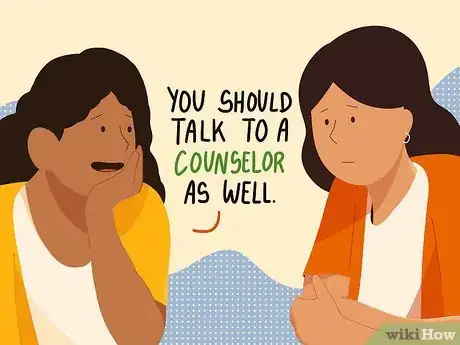This article was co-authored by Lisa Shield and by wikiHow staff writer, Jessica Gibson. Lisa Shield is a love and relationship expert based in Los Angeles. She has a Master's degree in Spiritual Psychology and is a certified life and relationship coach with over 17 years of experience. Lisa has been featured in The Huffington Post, Buzzfeed, LA Times, and Cosmopolitan.
There are 9 references cited in this article, which can be found at the bottom of the page.
wikiHow marks an article as reader-approved once it receives enough positive feedback. In this case, 90% of readers who voted found the article helpful, earning it our reader-approved status.
This article has been viewed 362,462 times.
If you're worn out from interacting with an insecure person, you may just need to change your strategy. People can feel insecure for a number of reasons—a partner might be jealous, a co-worker might have low self-esteem, or a relative might struggle with relationships. Whatever the reason, treating them with kindness and respect can go a long way! For practical suggestions, check out our tips below.
Steps
Expert Q&A
Did you know you can get expert answers for this article?
Unlock expert answers by supporting wikiHow
-
QuestionHow should I respond to someone who feels insecure?
 Lisa ShieldLisa Shield is a love and relationship expert based in Los Angeles. She has a Master's degree in Spiritual Psychology and is a certified life and relationship coach with over 17 years of experience. Lisa has been featured in The Huffington Post, Buzzfeed, LA Times, and Cosmopolitan.
Lisa ShieldLisa Shield is a love and relationship expert based in Los Angeles. She has a Master's degree in Spiritual Psychology and is a certified life and relationship coach with over 17 years of experience. Lisa has been featured in The Huffington Post, Buzzfeed, LA Times, and Cosmopolitan.
Life & Relationship Coach
Warnings
- If this person seems depressed, very anxious, and withdrawn, and is getting worse, don't hesitate to call a crisis counselor for help and resources. Contact the Suicide and Crisis Lifeline: 988 or https://988lifeline.org/. If you're outside the U.S., look up your country's suicide hotline using an international suicide hotline list like https://www.opencounseling.com/suicide-hotlines.⧼thumbs_response⧽
References
- ↑ Lisa Shield. Dating Coach. Expert Interview. 13 December 2018.
- ↑ https://www.psychologytoday.com/blog/fulfillment-any-age/201602/4-ways-deal-insecure-people
- ↑ https://www.bbc.com/worklife/article/20150717-truly-mean-or-just-insecure
- ↑ https://www.bbc.com/worklife/article/20150717-truly-mean-or-just-insecure
- ↑ https://kidshealth.org/en/teens/power-positive.html
- ↑ https://www.psychologytoday.com/us/articles/200609/dealing-difficult-people
- ↑ http://www.cognitivehealing.com/personal-growth/how-to-develop-healthy-boundaries-in-codependent-relationship/
- ↑ https://www.psychologytoday.com/us/blog/the-mysteries-love/202103/how-tackle-jealous-partner-or-envious-friend
- ↑ https://www.psychologytoday.com/us/blog/fulfillment-any-age/201602/4-ways-deal-insecure-people
About This Article
To interact with an insecure person, create boundaries and protect yourself from hurtful behavior. This will help you engage with the person in a sympathetic and supportive way. Show them you're listening and that you value their input. You can also encourage them to develop a positive mindset so they believe in themselves. This can do a lot toward boosting their self-esteem and improving your relationship with them. For more tips from our co-author, including how to help someone improve their self-esteem, read on!

















-Step-17.webp)






















































